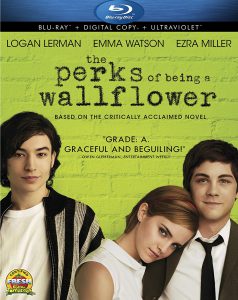As time goes by, we all forget how awful high school was, but “The Perks of Being a Wallflower” (now on DVD) brings it all rushing back — and with that accomplished, it proceeds to remind us of how great high school was. But first, the rough stuff: In one of the early scenes in the movie, our protagonist, Charlie (Logan Lerman from “Jack & Bobby”) sits down in English class and the girl next to him says, “Nice Trapper Keeper, faggot.”
Oh, by the way, “Perks” is set in 1989, because that’s when writer-director (and author of the book) Stephen Chbosky (whose credits include the forgettable high school sitcom “Brutally Normal” and the cult favorite “Jericho”) was in high school. If the story isn’t strictly autobiographical, we can assume a lot of it is, and certainly the mood of the piece is spot-on. I love the barely-there, delicate piano music (written by Chbosky) that accentuates quiet, intense scenes between Charlie and Sam (“Harry Potter’s” Emma Watson). There are so many reasons why they can’t be a couple — she’s a senior, he’s a freshman; she’s outgoing, he’s, well, a wallflower. And yet it’s a legitimate — if unorthodox — love story, and not just of the one-way variety.
While Charlie is compelling as the film’s quiet center — voiceover letters to a mysterious someone help us get to know him — and Sam is lovely yet believably flawed, Ezra Miller is the scene-stealer as Patrick, Sam’s gay stepbrother who thrives in his role as an outcast. Rounding out the group of friends are Mary Elizabeth (“Parenthood’s” Mae Whitman) and Alice (newcomer Erin Wilhelmi). Charlie’s friends, of course, are the good things about high school, the “perks” of a cruel setting where people are thrown together in tight quarters and can’t easily hide their problems or quirks. Chbosky also throws a rather underdeveloped bone to the classic “best teacher I’ve ever had” in the form of Paul Rudd’s Mr. Anderson, whose skill is apparently having a pile of classic literature on hand to lend to Charlie — like “Catcher in the Rye,” natch.
I’d like to ask current high school students if they think this portrayal of 1989 American high school is meaner and coarser than the present day. Is it really social suicide to answer questions in English class? Is it really uncool to admit that you’ll be reading for pleasure over the summer when your teacher asks? I have this idea that “high school” has matured through the years, but it probably does stay mostly the same, doesn’t it?
The 1989 setting also allows for mix tapes (as in cassettes) and the nostalgic notion of “finding” a song. In the film’s centerpiece scene, the gang drives through a tunnel (by the way, the setting is Pittsburgh, I think, although that’s not crucial to the story) and David Bowie’s “Heroes” comes on the radio. Tellingly, this is the first time any of them have heard the song, and back in those days, it wasn’t simply a matter of looking it up on iTunes and burning a copy — or heck, looking it up on your phone and playing it again immediately. It’s just a cool song that eludes them for the rest of the movie. (By the way, “Perks” makes the best use of “Heroes” since the Wallflowers, appropriately enough, covered it for 1998’s “Godzilla.”)

One tiny qualm I have with “Perks” — which, retroactively, is easily among my top 10 movies of 2012 — is the external, melodramatic aspect to the arcs of both Sam and Charlie. Simply by being about these kids’ time in high school, “Perks” would’ve hit that sweet spot of being both universal and special. Although the extra drama folds into the story fairly smoothly, it also slightly undermines the idea that high school is bad for everybody, not just these specific characters.
Still, to tread this territory that John Hughes and others have covered so heavily and still deliver a film where I’m hanging on every scene — that’s quite an accomplishment.

